10 Key Insights on Panel Survey for Market Research Analysts

10 Key Insights on Panel Survey for Market Research Analysts
Overview
The article titled "10 Key Insights on Panel Survey for Market Research Analysts" presents essential strategies and considerations for effectively utilizing panel surveys in market research. It highlights the structured methodologies that enhance data quality, the ethical practices that ensure participant trust, and the technological advancements that improve engagement. These elements are crucial for analysts aiming to leverage panel surveys effectively. By understanding these dynamics, market researchers can significantly enhance their data collection processes and outcomes.
Furthermore, the article discusses various trends and best practices that underscore the importance of these strategies. For instance, how can analysts ensure they are adopting the most effective methodologies? By aligning their approaches with current trends, they can not only improve data quality but also foster greater participant engagement. This leads to more reliable insights, ultimately benefiting their research objectives.
In conclusion, the insights provided in this article serve as a guide for market research analysts seeking to optimize their use of panel surveys. By implementing these strategies, they can enhance their research effectiveness, ensuring that their findings are both accurate and actionable.
Introduction
In the rapidly evolving landscape of market research, panel surveys have emerged as a cornerstone for gathering actionable insights. These surveys allow analysts to track changes in consumer behavior over time, providing a wealth of data that informs strategic decisions. However, as the demand for high-quality data intensifies, challenges associated with panel surveys—such as participant attrition and response variability—become increasingly pronounced.
How can market research analysts navigate these complexities? By harnessing the full potential of panel surveys, they can ensure their findings remain relevant and impactful.
Initial Data Offering: A Hub for Discovering Quality Datasets
The Initial Data Offering (IDO) serves as a centralized platform where market research analysts can discover and access high-quality datasets. By curating unique datasets across different fields, IDO simplifies the process of locating relevant information for conducting panel surveys. This accessibility is vital for analysts who need reliable data to inform their research methodologies and enhance their findings. With a commitment to quality and community engagement, IDO stands out as a preferred choice for data-driven insights.
What makes IDO particularly advantageous? Its curated datasets not only save time but also ensure that analysts have access to the most relevant and trustworthy information available. This focus on quality enhances the overall research process, allowing analysts to draw more accurate conclusions and make informed decisions. Ultimately, IDO empowers professionals by providing the tools they need to succeed in a data-driven landscape.
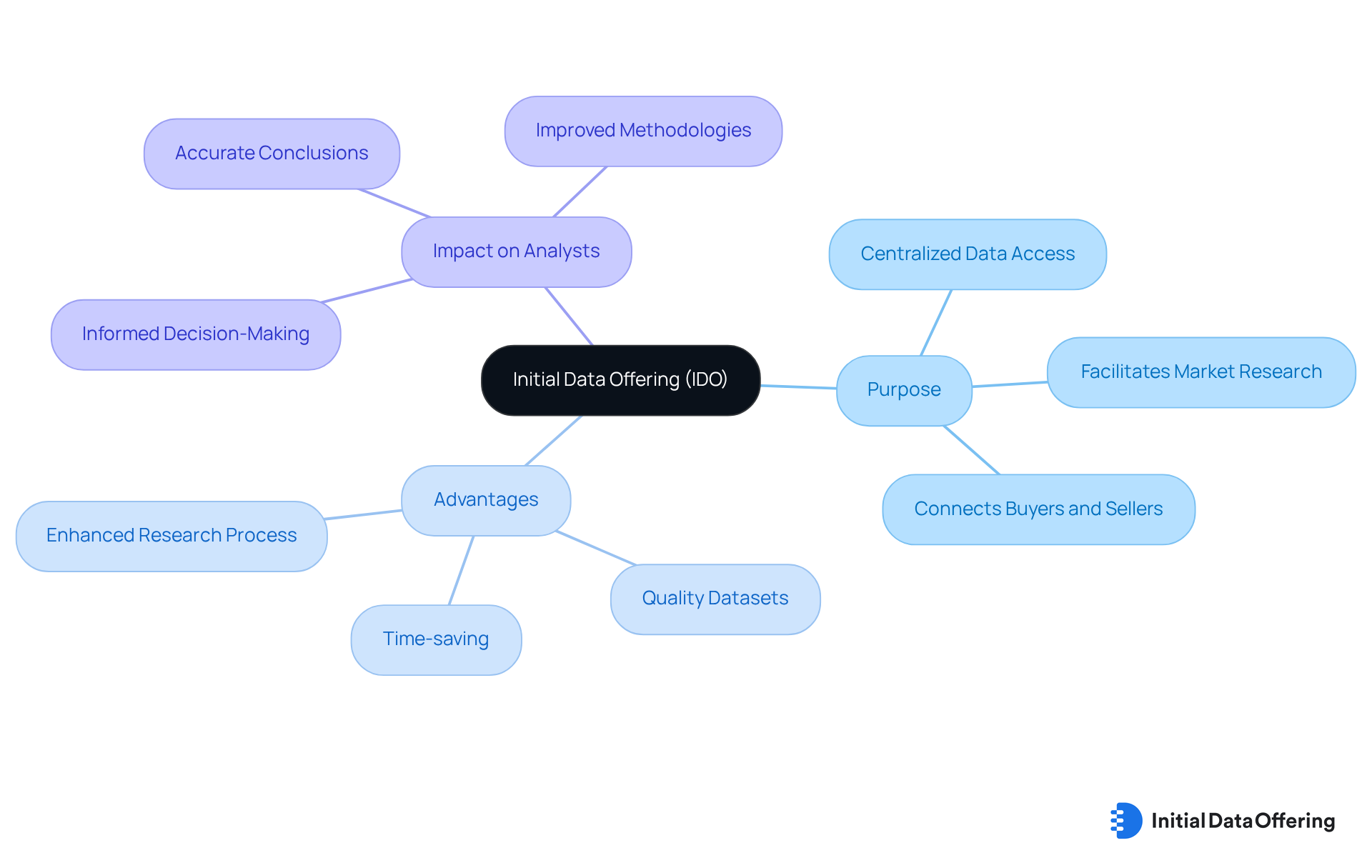
Panel Surveys Defined: Purpose and Importance in Market Research
A panel survey represents a research approach where a cohort of participants is repeatedly questioned over a specific duration. This method enables researchers to track changes in attitudes, behaviors, and opinions over time. The primary feature of group assessments lies in their ability to provide longitudinal information, which is essential for understanding trends and making informed decisions in market research. The advantage of this approach is that it uncovers detailed insights into consumer behavior, allowing organizations to effectively adapt to changing market dynamics. The benefit of utilizing longitudinal research with group questionnaires is clear: it equips analysts with actionable insights that can drive strategic decisions.
Current trends in questionnaire methodologies include the adoption of mobile-first approaches and AI-driven analytics. These innovations enhance participant engagement and improve data quality. As the market research environment evolves, the ability to monitor shifts in consumer behavior through a panel survey will remain a crucial resource for analysts. For instance, consider the significant increase in abandonment rates for longer questionnaires, which rose from 23% in 2017 to 53% in 2022. This statistic underscores the necessity for engaging design formats in research tools.
Furthermore, as Melanie Courtright from the Insights Association emphasizes, 'data integrity is essential for significant analysis and informed decision-making.' Thus, integrating mobile-first strategies and AI analytics into questionnaires not only enhances information quality but also boosts participant involvement. How can your organization leverage these insights to improve your market research strategies? By adopting these methodologies, you can ensure that your research remains relevant and impactful.
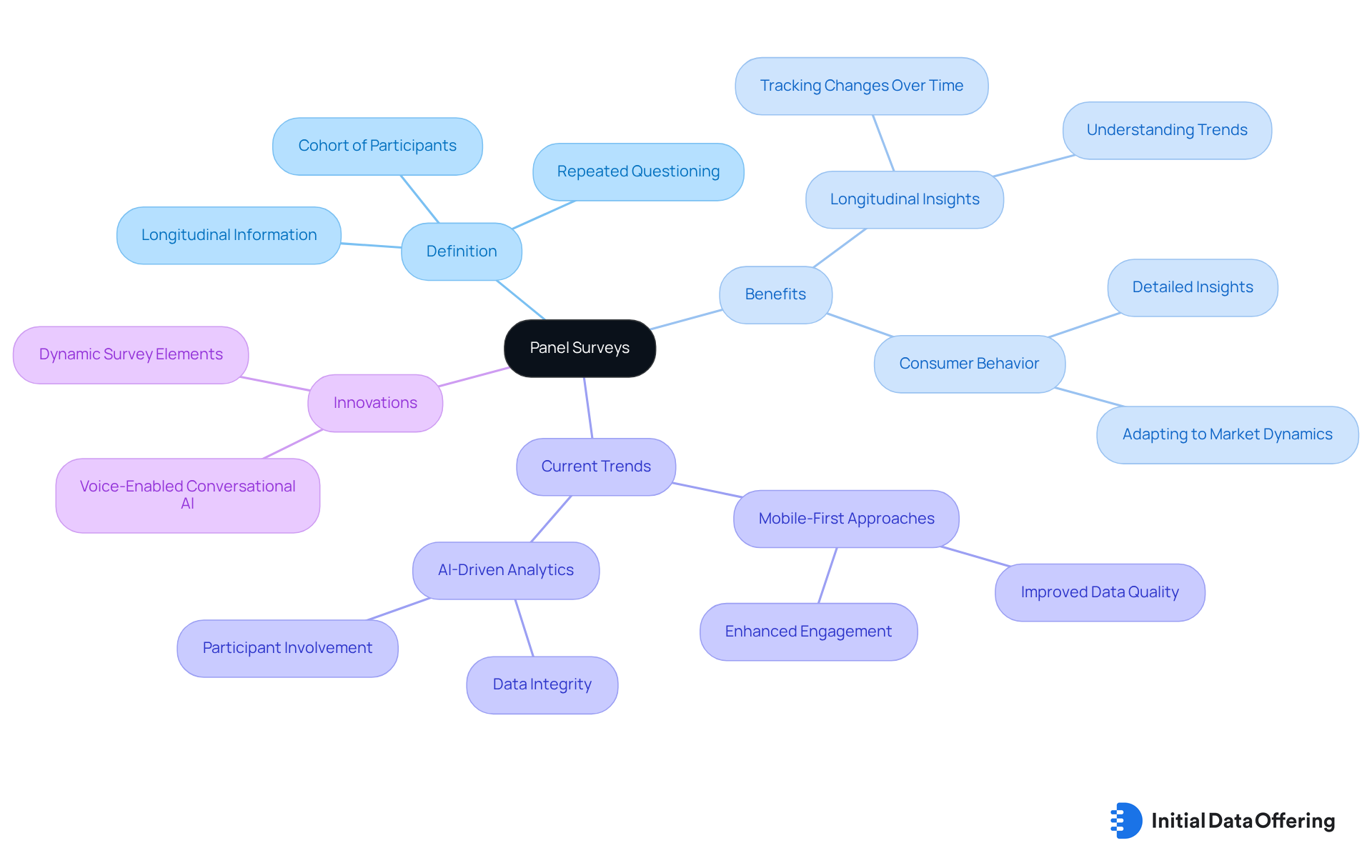
Benefits of Panel Surveys: Consistency and Reliability in Data Collection
One of the main advantages of group assessments is their uniformity in information gathering. By utilizing a panel survey that includes the same participants multiple times, researchers can obtain reliable data that reflects changes over time. This consistency not only enhances the validity of the findings but also allows analysts to draw more accurate conclusions about market trends and consumer behavior. However, it is essential to address ethical considerations, such as obtaining informed consent and protecting personal information, to maintain trust with participants.
Moreover, questionnaire fraud poses a significant challenge in group studies; deceitful responses can compromise the quality of the information collected. Researchers must also be vigilant about conditioning effects, where earlier responses may influence subsequent answers, potentially skewing the results. Despite these challenges, the structured approach of group assessments, paired with the advantages of integrating qualitative techniques, ensures that information gathering remains robust and reflective of real-world changes. This makes panel surveys an invaluable resource for market research analysts, enabling them to derive insights that are both actionable and relevant.
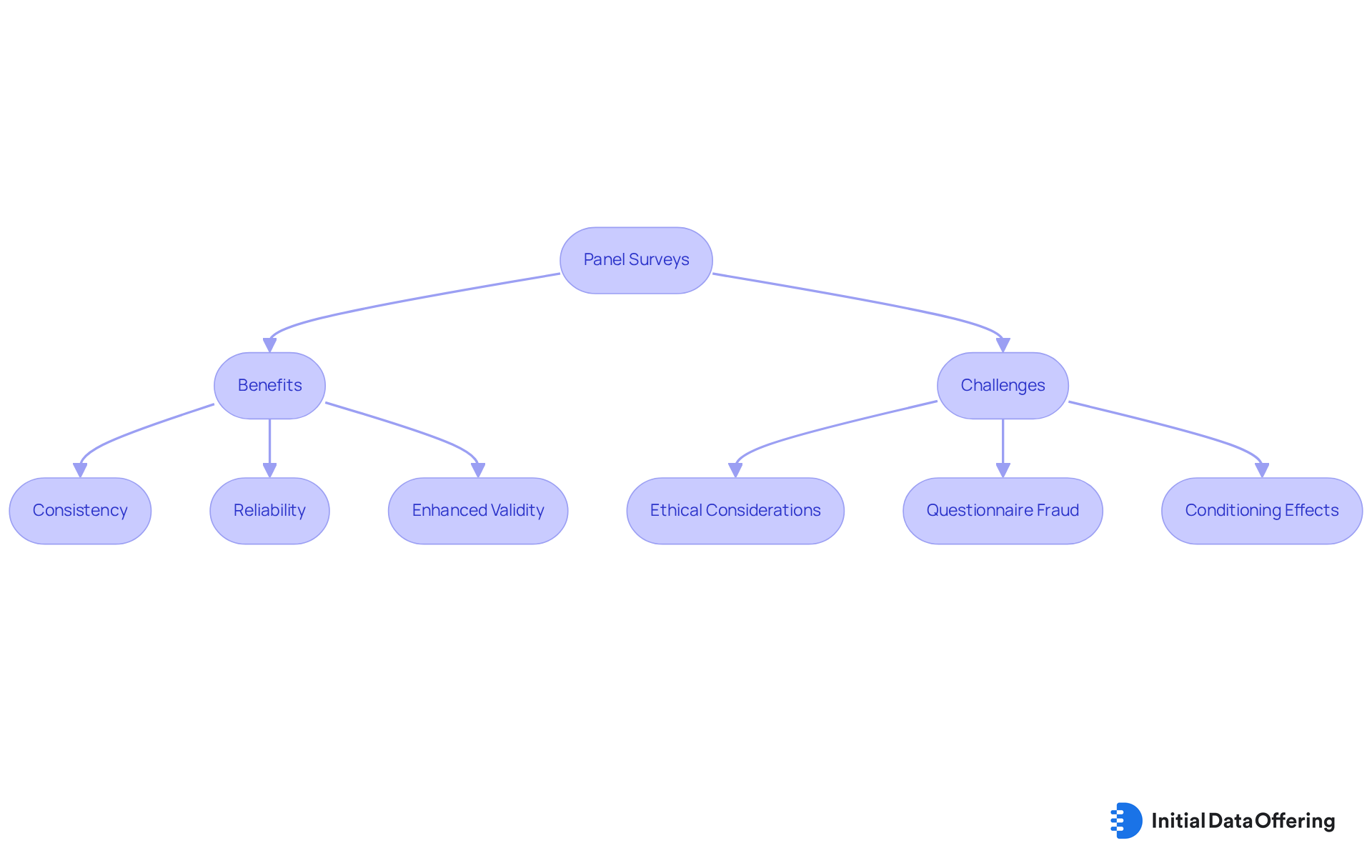
Challenges of Panel Surveys: Navigating Common Pitfalls
Panel surveys offer valuable insights, yet they present several challenges that can compromise data quality. A key issue is panel attrition, where respondents discontinue participation over time, potentially skewing results. For instance, panelists recruited in 2014 participated in an average of 58 assessments by October 2020. In contrast, more recent groups, such as those recruited in 2018, showed a registration rate of only 76%, compared to 82% among the 2014 participants. This decline can result in biased estimates, particularly if the remaining panelists systematically differ from those who have exited.
Sustaining participant involvement poses an additional challenge; repeated questionnaires may lead to respondent fatigue, resulting in lower response rates and diminished data integrity. Research indicates that older demographics generally report higher media usage and political engagement than their younger counterparts, suggesting that familiarity with the data collection process can enhance reporting accuracy over time. Notably, younger panelists (ages 18-49) appear less influenced by empanelment on their reporting behaviors compared to older individuals, emphasizing the necessity for tailored engagement strategies across different demographics.
To address these challenges, researchers can adopt strategies such as:
- Offering fair compensation
- Recognizing contributions of panel survey participants
These strategies have been shown to enhance engagement and reduce attrition rates. As Xiaoyi Chai, General Manager at dataSpring, noted, "As the industry evolves, our methods for retention have also advanced, allowing us to sustain stable, high-quality groups in markets like China, Korea, and Indonesia." Additionally, employing a web application to semi-automate data collection workflows can help maintain participant retention. This was evidenced in a study involving Syrian refugees in Lebanon, where retention rates reached 67 percent over three and a half years due to this innovative approach.
Understanding and addressing group attrition is vital for ensuring the reliability of research findings obtained from a panel survey. As the industry progresses, implementing best practices and innovative solutions will be essential for enhancing the quality of information gathered through group studies.
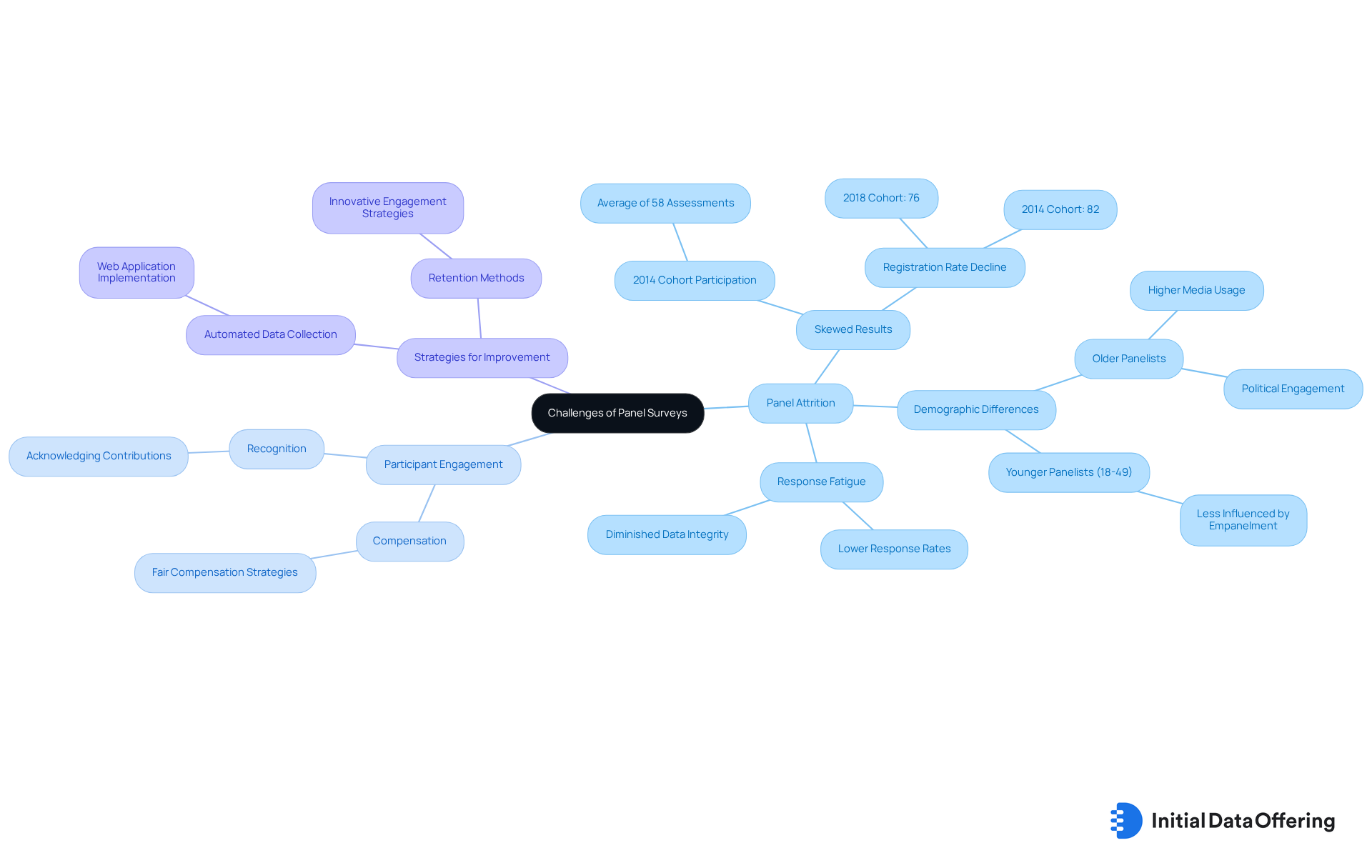
Best Practices for Designing Effective Panel Surveys
To create effective research studies, investigators should concentrate on clear objectives, well-organized questionnaires, and suitable sampling techniques. Setting clear research objectives is essential; it directs the entire study process and ensures that questions remain pertinent and focused. A well-structured questionnaire enhances response rates and maintains respondent engagement through concise and clear language.
For instance, effective group assessments often incorporate various question formats, leading to more comprehensive information and a greater understanding of consumer behavior. As Nathan Clarke notes, 'Panel surveys aren't just some fancy academic notion; they serve as a secret weapon in the arsenal of savvy researchers and marketers.'
Furthermore, data indicate that "Group assessments are economical and efficient in comparison to face-to-face or postal evaluations," highlighting the advantages of well-designed group assessment strategies. By employing these best practices, researchers can significantly improve the quality of the data collected, ultimately leading to more actionable insights that inform strategic decisions.
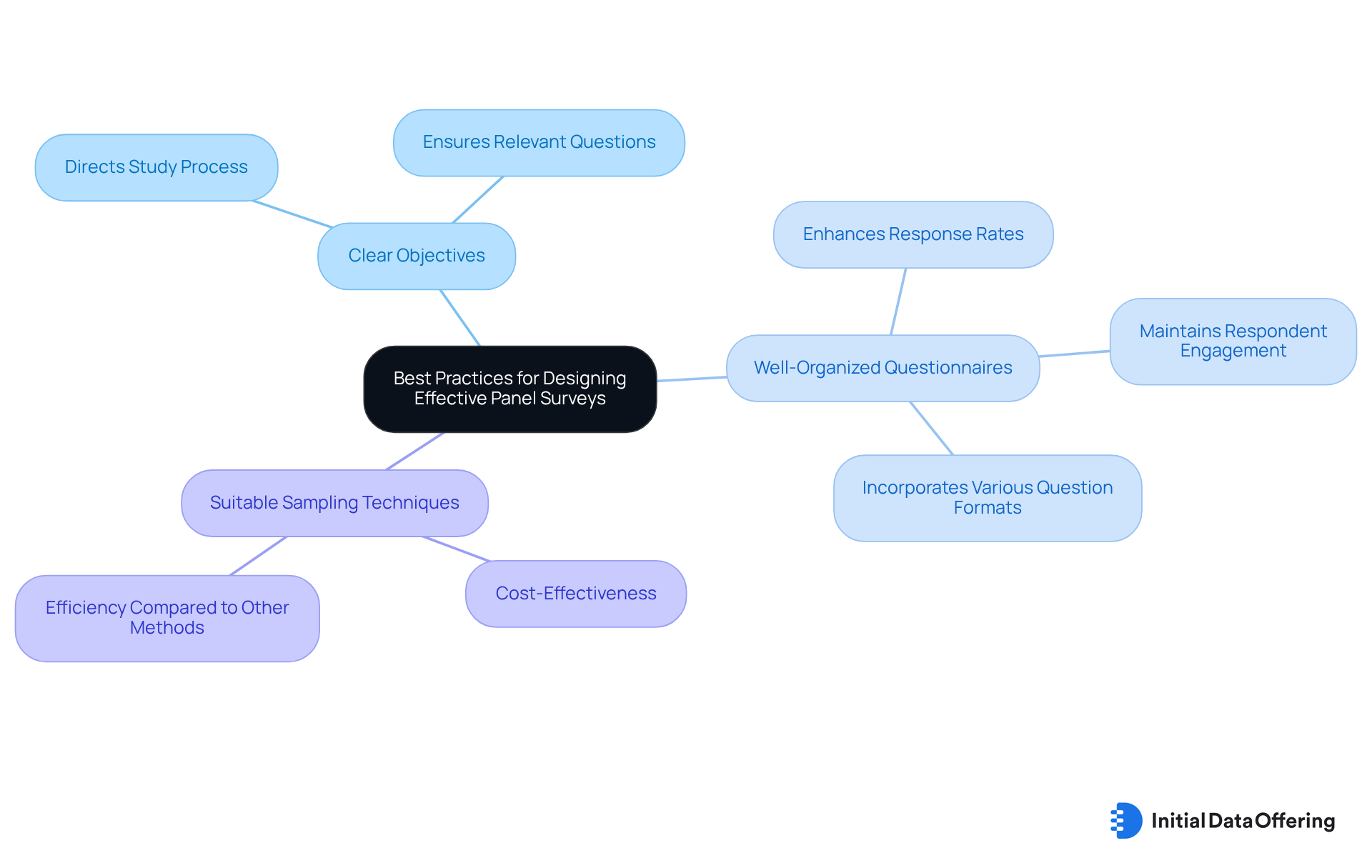
Incentives in Panel Surveys: Boosting Participation and Data Quality
Incentives play a crucial role in enhancing participation rates in panel surveys. Research indicates that offering rewards—such as monetary incentives or exclusive content—significantly motivates participants to complete questionnaires and maintain long-term involvement. For example, studies reveal that monetary incentives can boost response rates by up to 19% compared to surveys lacking rewards. Additionally, response rates tend to increase with the size of the incentive, albeit at a declining rate, underscoring the necessity of strategically designed incentive structures. Notably, prepaid incentives are particularly effective, as they foster trust and encourage participation by creating a sense of reciprocity among respondents.
The impact of rewards extends beyond mere participation; they also enhance the quality of the information collected. Participants who receive incentives are often more likely to provide reliable and comprehensive responses, resulting in richer insights for researchers. Findings suggest that respondents incentivized with cash typically deliver higher quality data than those who do not receive any rewards. This correlation emphasizes the importance of well-crafted incentive frameworks in data collection methodologies.
Effective rewards for increasing participation in polls encompass not only cash but also gift cards and exclusive access to content. Research indicates that larger single prizes are more attractive than multiple smaller ones, suggesting that thoughtful structuring of incentives can yield improved participation outcomes. Furthermore, emails highlighting lottery incentives can significantly elevate response rates, reinforcing the efficacy of lotteries as a strategy for enhancing participation. By leveraging these insights, researchers can markedly improve both participation rates and the quality of information gathered in their panel survey studies.
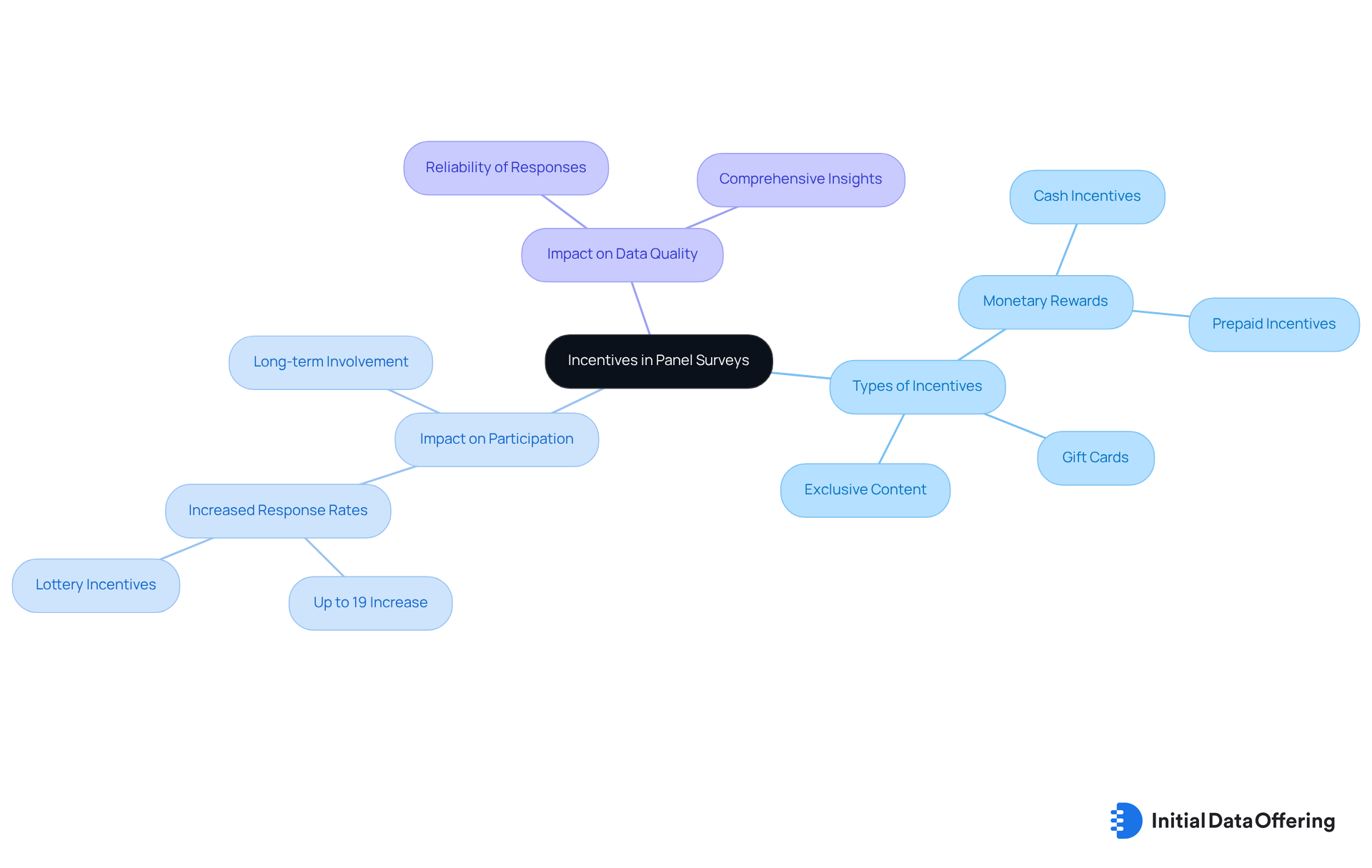
Mode Effects in Panel Surveys: Understanding Response Variability
Mode effects pertain to the changes in responses that arise from different data-gathering approaches, such as online versus in-person questionnaires. Understanding these effects is crucial, as they can significantly impact the validity of research findings. For instance, research indicates that online participants report greater levels of continuous internet use (36%) compared to phone participants (28%). Furthermore, a striking 84% of individuals in the online group indicated using the internet daily. This highlights how the response method can influence self-reported behaviors. Additionally, cognitive processing time varies between modes; web respondents often take 7-8 seconds longer to answer factual questions, which may enhance the quality of their responses.
Researchers emphasize the importance of meticulously crafting questionnaires to minimize bias. Employing multiple survey modes in a panel survey can enhance representation and minimize coverage errors. The introduction of push-to-web (PTW) strategies alongside conventional methods has been shown to enhance response rates in a panel survey while preserving information integrity. Michael Davern notes that providing information collection methods in succession can lead to higher response rates compared to a single method, as it decreases coverage and nonresponse-related mistakes. By recognizing and accounting for mode effects, analysts can ensure more precise interpretations of poll information, ultimately leading to better-informed decisions.
How can these insights apply to your research practices? By understanding the implications of mode effects, you can enhance the accuracy of your findings and make more informed decisions based on the data collected.
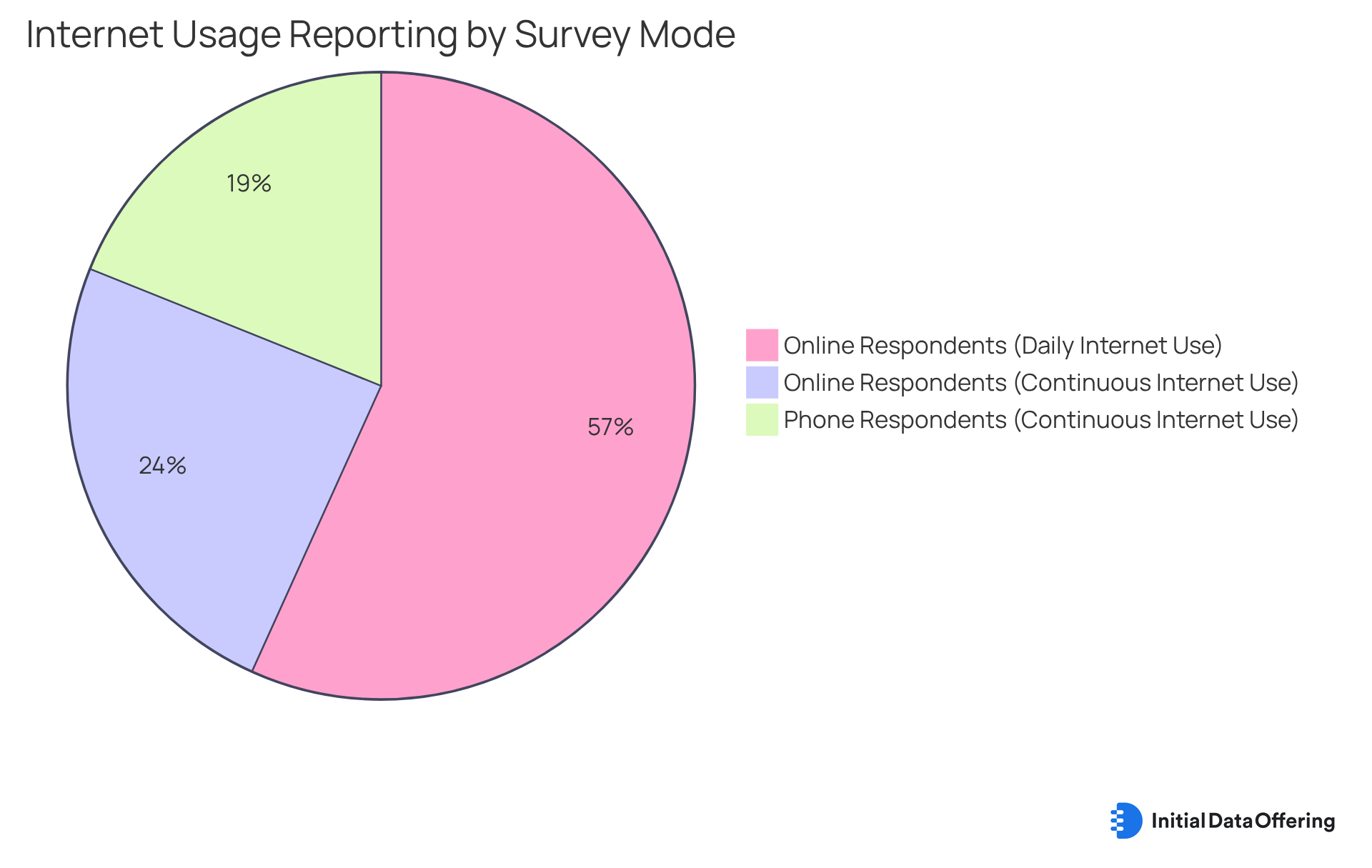
Ethical Considerations in Panel Surveys: Ensuring Trust and Integrity
Ethical considerations are vital in ensuring the quality and reliability of the information gathered from panel surveys. Researchers must prioritize safeguarding respondents' privacy and ensuring that information collection processes are transparent. Notably, 85% of consumers have taken measures to tackle privacy and security concerns, indicating an increasing awareness of the significance of information protection. This awareness underscores the necessity for openness in practices, as establishing trust with participants is essential for eliciting honest responses, ultimately enhancing the integrity of the research.
For instance, organizations that demonstrate a commitment to information protection and transparency, such as Google with its updates to privacy policies and Apple with its 'Privacy Nutrition Label,' can distinguish themselves in the market. This commitment can lead to increased participation rates and more precise insights. Additionally, 65% of individuals report greater confidence in brands that comply with GDPR and CCPA regulations, reinforcing the argument for ethical practices in building trust. Analysts should adhere to ethical guidelines, such as obtaining informed consent and ensuring anonymity, to foster a positive relationship with their panelists involved in a panel survey.
By prioritizing these ethical practices, market researchers can create an environment conducive to authentic insights, free from biases, and reinforce their role as trusted stewards of participant information. Non-compliance with data privacy regulations can lead to substantial fines and legal repercussions, further emphasizing the critical nature of adhering to ethical guidelines in market research.
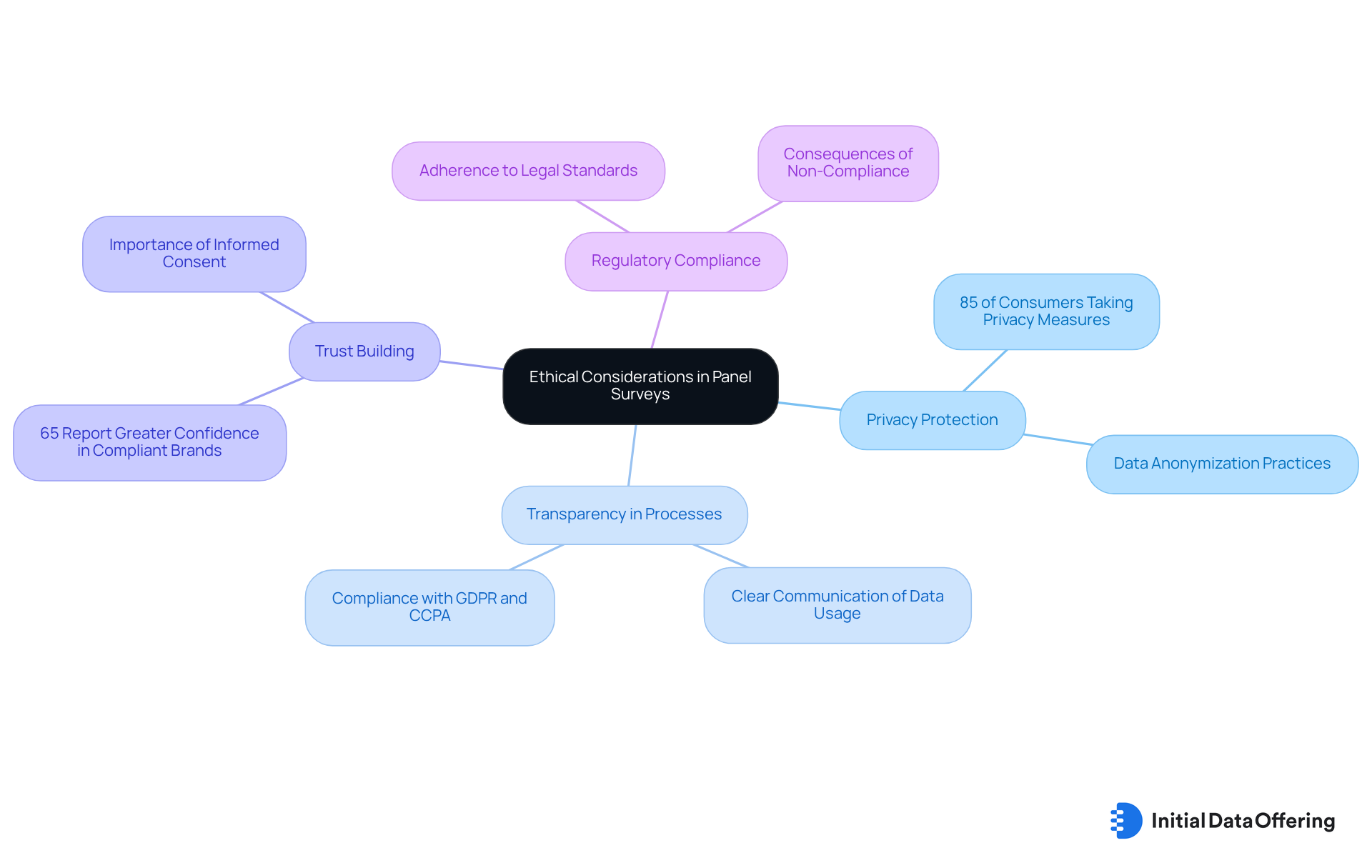
Case Studies: Successful Applications of Panel Surveys in Research
Case studies showcasing the effective use of questionnaires reveal their significant impact on business decision-making. For example, a leading consumer goods firm employed questionnaires to monitor shifts in brand perception over time. This strategic approach not only informed their marketing modifications but also enhanced their market positioning. Moreover, it provided actionable insights that guided future campaigns.
Statistics indicate that firms utilizing group assessments have observed notable changes in brand perception, with many establishing a direct correlation between assessment insights and improved customer interaction. Such instances underscore the practical advantages of group assessments, illustrating their role in shaping informed business strategies and facilitating effective marketing decisions.
How might these insights influence your own approach to market research and strategy development?
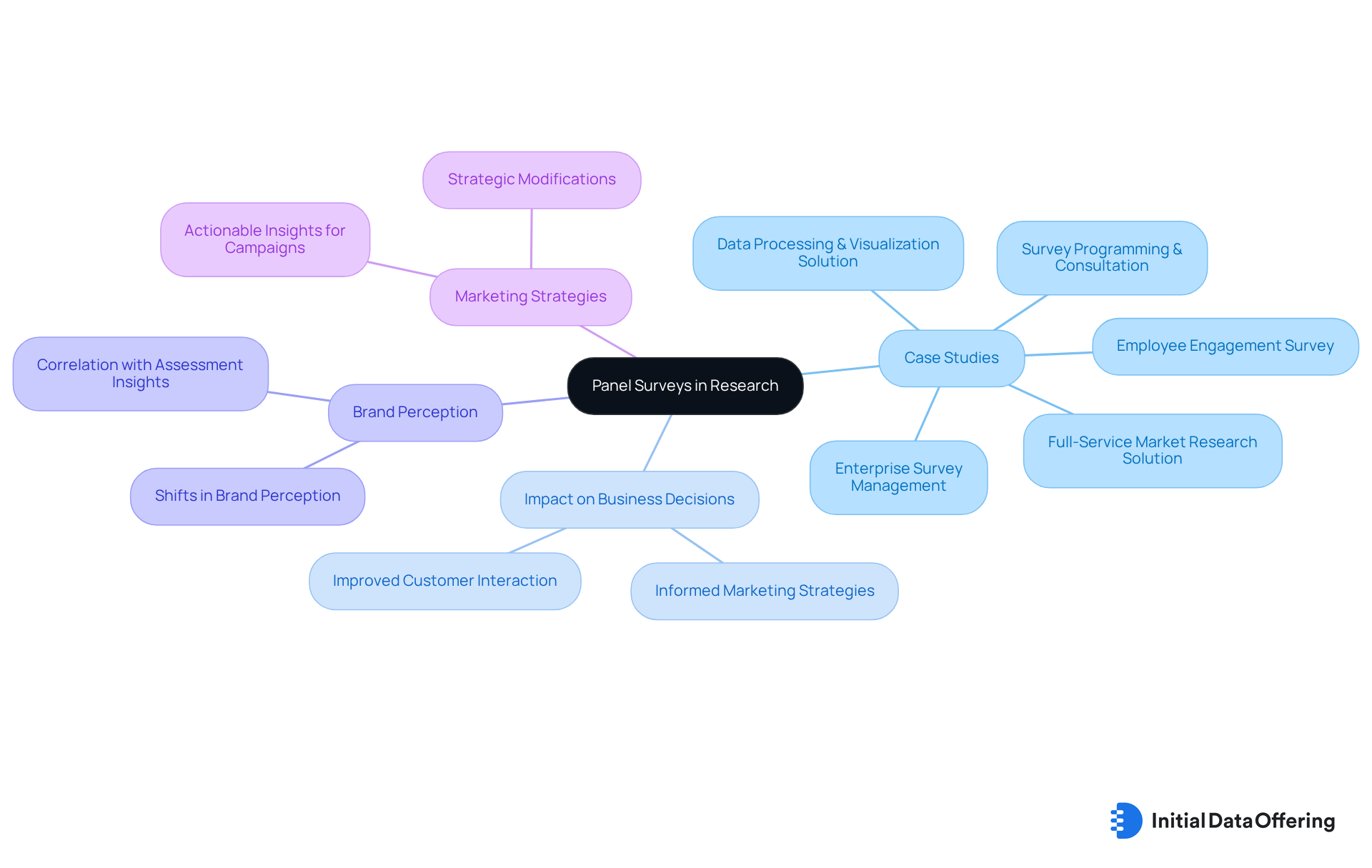
Emerging Trends in Panel Surveys: Adapting to the Evolving Landscape
Emerging trends in panel assessments are significantly influenced by technological advancements, particularly through the incorporation of mobile questionnaires and online platforms. These innovations enhance accessibility and convenience for respondents, making participation easier and more engaging.
For instance, the increasing adoption rates of mobile questionnaires indicate a shift towards more adaptable collection techniques that cater to the preferences of contemporary consumers. Furthermore, the integration of artificial intelligence in information analysis is gaining momentum, allowing researchers to extract deeper insights and improve the processing of results.
This evolution not only enhances the quality of data collected but also boosts the overall efficiency of research methodologies. To fully leverage the potential of panel surveys, analysts must embrace these technological trends, ensuring their research remains relevant and impactful in an increasingly digital landscape.
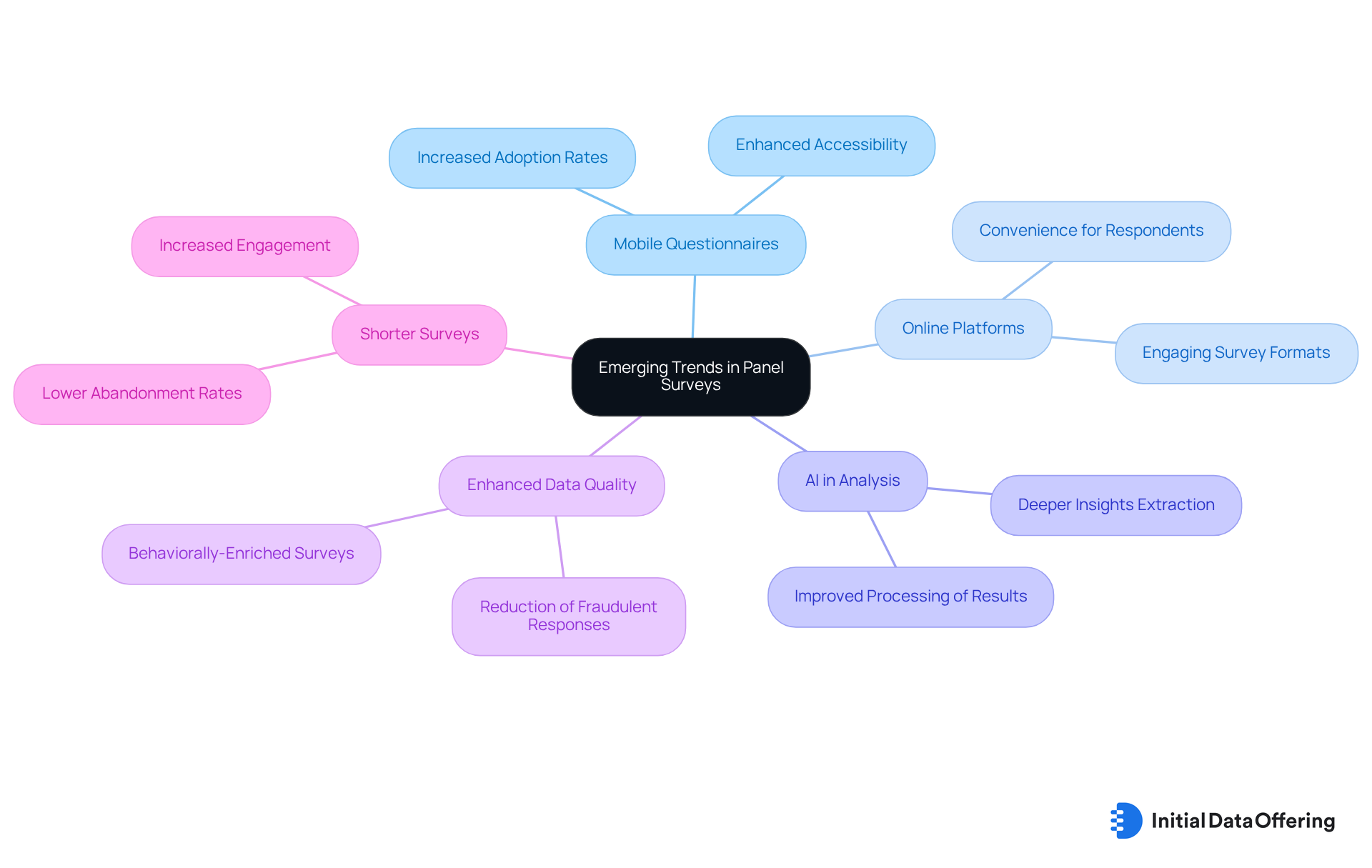
Conclusion
The exploration of panel surveys in market research underscores their essential role in delivering reliable and actionable insights. By leveraging structured methodologies and innovative technologies, analysts can effectively track consumer behavior over time, enhancing the quality of their research outcomes. The insights gathered through panel surveys not only inform strategic decisions but also empower organizations to adapt to the ever-changing market landscape.
Key arguments throughout the article emphasize:
- The significance of ethical considerations
- The benefits of consistent data collection
- The necessity of integrating modern technological advancements
From the Initial Data Offering that provides quality datasets to the various best practices for designing effective surveys, it is evident that thoughtful implementation can significantly improve both participation rates and data integrity. Additionally, addressing common challenges such as panel attrition and response variability is crucial for maintaining the reliability of findings.
In summary, embracing the evolving trends and best practices in panel surveys is imperative for market research analysts aiming to stay ahead in their field. By prioritizing participant engagement and ethical standards, organizations can foster trust and enhance the richness of the data collected. The future of panel surveys hinges on their capacity to adapt to new methodologies and technologies, ensuring they remain a vital tool for delivering meaningful insights in market research.
Frequently Asked Questions
What is the Initial Data Offering (IDO)?
The Initial Data Offering (IDO) is a centralized platform that allows market research analysts to discover and access high-quality datasets across various fields, simplifying the process of locating relevant information for panel surveys.
How does IDO benefit market research analysts?
IDO provides curated datasets that save time and ensure access to relevant and trustworthy information, enhancing the research process and allowing analysts to draw more accurate conclusions.
What is a panel survey?
A panel survey is a research approach where a group of participants is repeatedly questioned over a specific duration, enabling researchers to track changes in attitudes, behaviors, and opinions over time.
Why are panel surveys important in market research?
Panel surveys provide longitudinal information that helps organizations understand trends and consumer behavior, allowing them to adapt effectively to changing market dynamics.
What are current trends in questionnaire methodologies for panel surveys?
Current trends include mobile-first approaches and AI-driven analytics, which enhance participant engagement and improve data quality.
What are the benefits of using panel surveys?
The main benefits include consistency and reliability in data collection, as the same participants are surveyed multiple times, leading to more valid findings and accurate conclusions about market trends.
What ethical considerations should researchers keep in mind when conducting panel surveys?
Researchers must obtain informed consent and protect personal information to maintain trust with participants.
What challenges do researchers face with panel surveys?
Challenges include questionnaire fraud, where participants may provide deceitful responses, and conditioning effects, where earlier responses influence later answers.
How can organizations leverage insights from panel surveys to improve their market research strategies?
By adopting methodologies like mobile-first strategies and AI analytics, organizations can ensure their research remains relevant and impactful, leading to better decision-making.